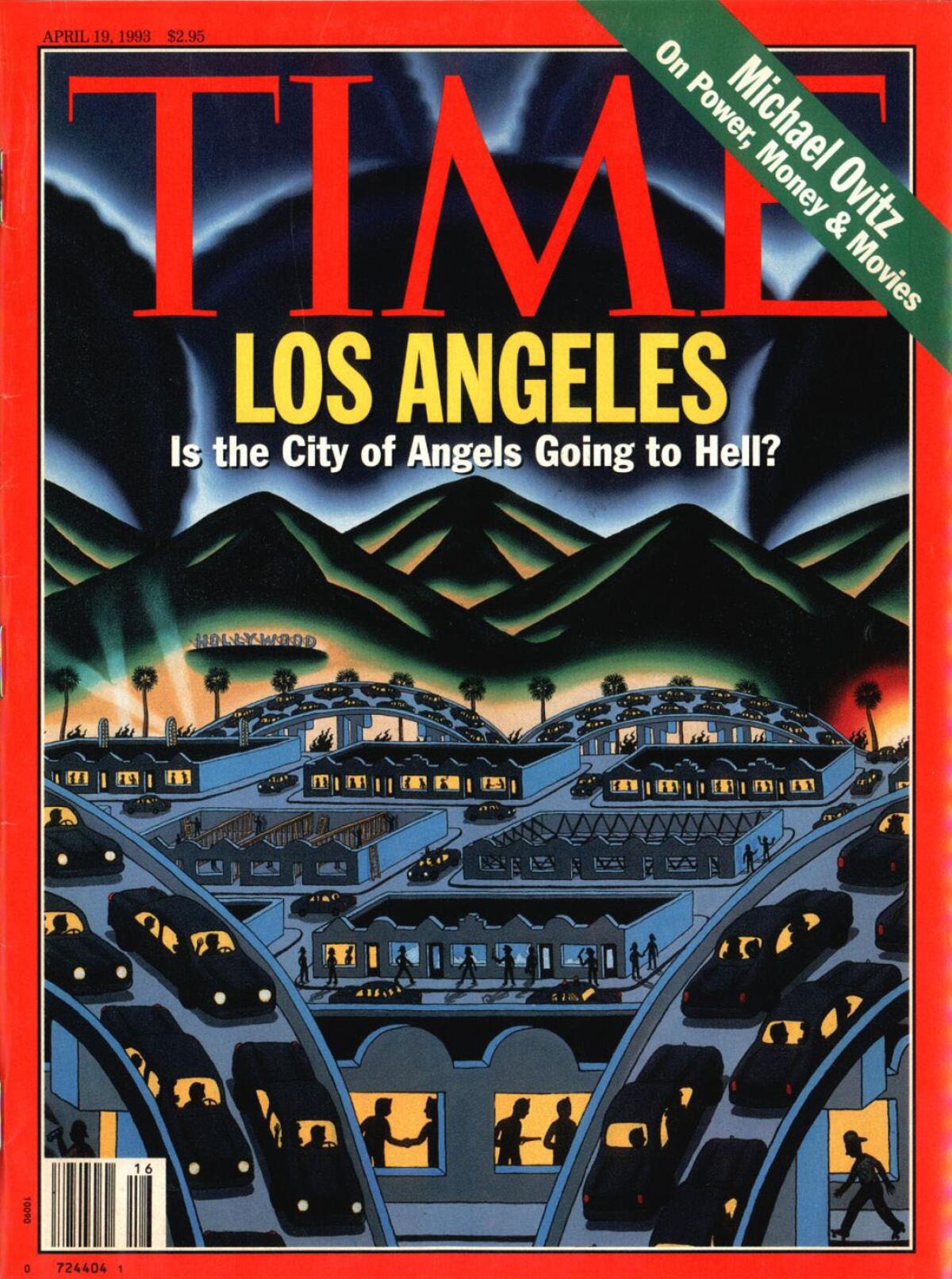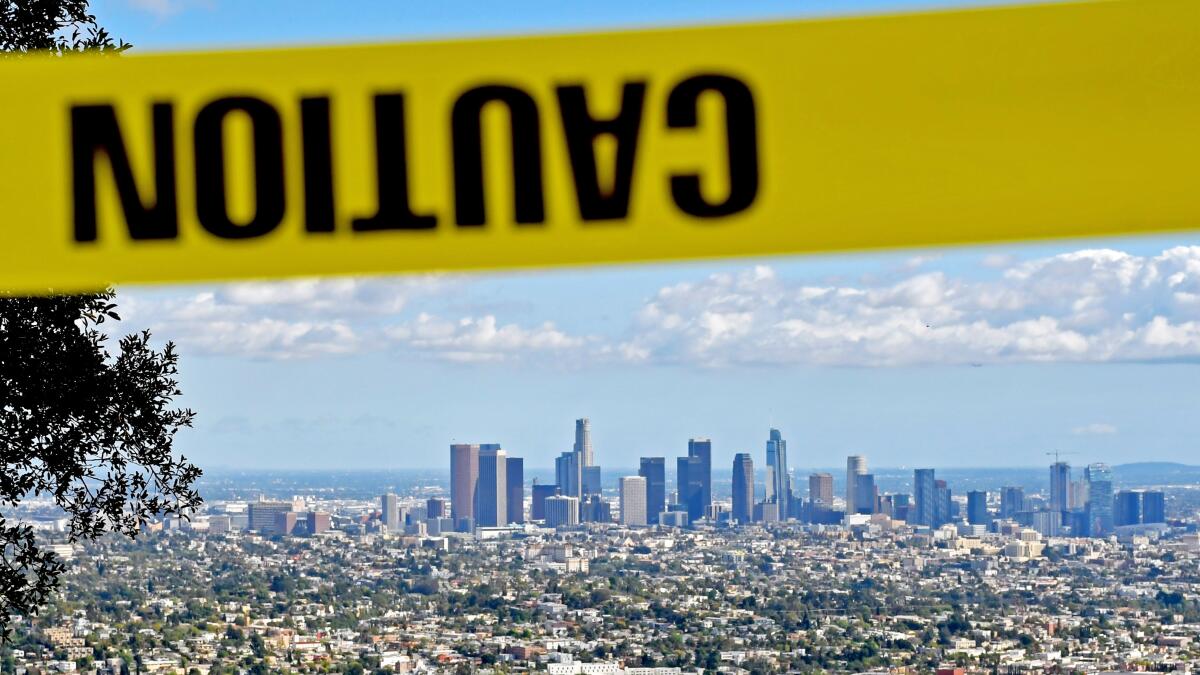California, it’s going to be OK. This is still our moment

- Share via
- It’s hard not to feel fatalistic about California’s future on this Wednesday morning. But the past offers us some hope.
By the time I started working as a reporter at the Los Angeles Times three decades ago, the California dystopia genre was already well established.
Three times in the early 1990s, the cover of Time magazine trumpeted the Golden State’s demise: “California: The Endangered Dream.” “California: State of Shock.” “Los Angeles: Is the City of Angels Going to Hell?” Not to be outdone, Newsweek weighed in with “California: American Dream, American Nightmare” and a few years later with “California in Crisis,” complete with a cartoon showing the state literally breaking apart and falling into the Pacific Ocean.
Trump scores a decisive victory over Harris, completing an extraordinary political comeback. Follow live coverage and results of the 2024 election.
Earthquakes. Wildfires. The palpable effects of climate change. Racial injustice. The very rich and the very poor coexisting uncomfortably. The booms and busts of an innovation economy. It’s the story of California — thrilling and a bit unstable at the same time. Back in the 1990s, the California-as-disaster-epic narrative was tinged with some gloating — a comeuppance for a star-making destination that for decades was America’s post-war wonderland. Now, the narrative feels more like a permanent state of mind as well as a culture war weapon. In a sign of the times, one popular podcaster talking about the painful recession gripping Hollywood recently declared, “L.A. is a much-better-weather version of Detroit right now.”
It’s easy to see Kamala Harris’ defeat as one more loss for California, both because she is a product of the state and because so much of her political philosophy was formed here.
Many Californians woke up Wednesday with a deep sense of darkness about the future of the state and the nation.

But does fatalism blind us to what California’s role needs to be right now and what it can do to move the world forward?
James Fallows makes that case in a pre-election essay in Wired, where he argues that California’s role as a force for good and innovation will continue despite the election results or even our own misgivings. He says the state’s pushback against the rise of Trumpism is far from our most important contribution.
American voters put Donald Trump back into the White House with a resounding defeat — not just of Kamala Harris but of the California values she represented.
“California deserves new attention as the ‘reinvention state’ rather than a ‘resistance state,’” he writes. “Even under Trump, there’s still a good chance that as California goes, so eventually goes the country, and eventually much of the world.”
Fallows, a noted American chronicler who grew up in Redlands, offers counternarratives to some of California’s bigger black eyes. Our grossly over-budget “train to nowhere” high speed rail system? It’s an epic project that, when finally completed, will fundamentally change the way we get around and potentially open up the Central Valley as a hub for desperately needed affordable housing. California as a Dickensian, self-interested world of excess and disorder? How about the state’s wildly successful citizen volunteer corps that is building community and compassion — and is being copied across the country?
The soul of America, on this November day of our Lord, is a dark and foreboding place. A place where the better angels of nature have been outmatched by fear and hatred.
His essay does not dwell on some of California’s huge and seemingly intractable challenges — homelessness, generational poverty in urban areas, the housing affordability crisis, the shocking toll rising temperatures are taking in so many parts of life. But he offers a rare sense of optimism and a reminder of the mid-century California exceptionalism that is increasingly hard to find in the Golden State.
Optimism doesn’t solve problems. But what about the feeling that our problems are vast and insurmountable? Fallows sees the “declinist alarmism” about California as coming from the same mindset that argues America is a failing state (something people have been saying since the 1960s, despite much evidence to the contrary.)

I recently read Chip Jacobs and William J. Kelly’s book “Smogtown,” an excellent history of L.A.’s long but surprisingly successful battle against air pollution. It’s hard to imagine living in that world now, where poisonous air kills children, your backyard garden, crops and even motorists who crash due to the blinding smog. But the most enlightening part of the book was its recounting of California’s uphill struggle to get the rest of America to care about smog. L.A. was choking, but to the rest of the country it seemed like a local problem. And the solution — regulating industry — seemed downright un-American. Washington turned its back on us. L.A. went to war with Detroit, which for decades successfully fought efforts to reduce auto emissions. But California finally prevailed, and in the process it began an environmental movement that changed the world for the better.
Eight pending California clean air rules were expected to prevent 11,000 premature deaths and provide $116 billion in health benefits over three decades.
It might be hard this week to take much solace in these lessons if you’re dismayed at the prospect of President Trump and Republicans in Washington turning back the clock on climate change regulations, LGBTQ+ protections and other measures that most Californians embrace. But holding onto hope and faith is essential in times like this. I devour a lot of self-help and self-improvement books, and many preach about the dangers of what happens when you give up.
Few people understand the California story better than Jerry Brown, mocked as “Governor Moonbeam” in the 1970s, hailed as an environmental savior in the 2010s.
“Every decade since the 60s, dystopian journalists write stories on the impending decline of our economy, our culture and our politics,” he said during his second turn as governor.
“I see unspent potential and incredible opportunity.”
More to Read
Sign up for Essential California
The most important California stories and recommendations in your inbox every morning.
You may occasionally receive promotional content from the Los Angeles Times.















